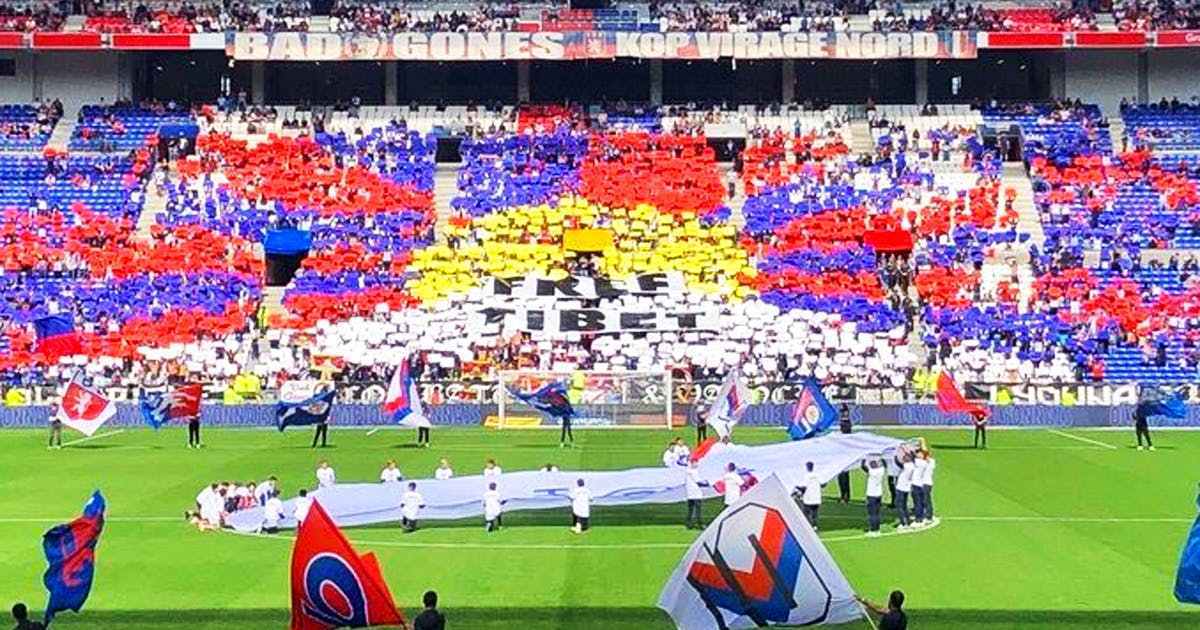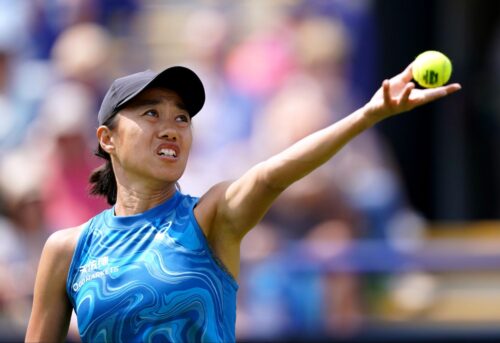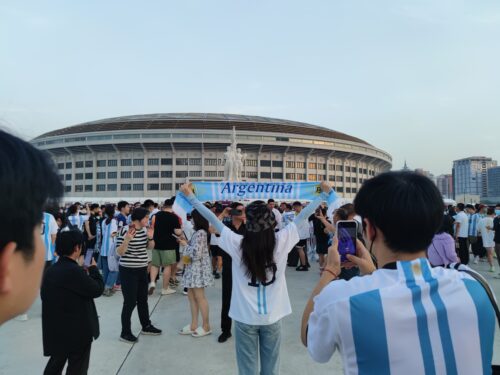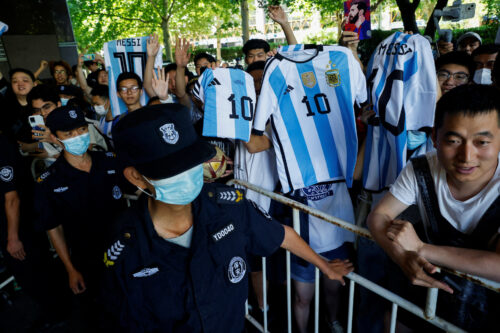French fans, angry at early start time, protest with massive Tibet flag

The China Sports Column is a The China Project weekly feature in which China Sports Insider Mark Dreyer looks at the week that was in the China sports world.
We come, once again, to that wonderful intersection between politics, business, and sports.
With the eyes of the athletics world focused on Doha for the biennial World Athletics Championships, it’s become very clear that almost no eyes belonging to actual Qataris are focused on the sporting action, with top-class events being played out in a virtually empty stadium.
But the political connections and the businessmen’s wallets have ensured that this is where that sporting action will take place.
That same scene may very well play out later this year at the season-ending WTA Finals event in Shenzhen, where the governmental guanxi of real estate company Gemdale makes it worth its while to bankroll the tournament to the tune of $14 million per year in prize money, even if — as seems likely — the brand new stadiums are far from full.
Another example of the politics-business-sports trifecta played out last weekend in Lyon, France, where local football fans of Olympique Lyonnais felt inconvenienced due to their game against Nantes being scheduled at the earlier-than-usual kickoff time of 1:30 pm — all because the league was trying to be more accommodating to Chinese fans, who would have tuned in to see the same match shown live at 7:30 pm, i.e., primetime on a Saturday night.
And, boy, did they show their displeasure.
Lyon’s hardcore fan group Bad Gones went to the considerable trouble of coordinating the entire north stand to hold colored cards to represent the Tibetan flag, with a “Free Tibet” banner added right in the middle.
The group also released a statement in which they said local fans had been disrespected by the scheduling change, which they maintained had been done for “a few hundred thousand viewers on the other side of the planet.”
Ominously, they added that they would be delighted to repeat the demonstration if it successfully pissed off both French league officials and the Chinese broadcaster.
There’s a bit of context here that’s necessary.
First, fans across almost all of the major European soccer leagues have grown used to the plethora of different match times, but the grumbling has remained even while new viewing habits have been formed.
Long gone are the days when top division teams in England, for example, would play the vast majority of their games at 3 pm on a Saturday afternoon.
Now, there are seven different time slots across the weekend for EPL games, all carefully selected by the broadcasters, who, in turn, pay astronomical sums to the league for the privilege to rearrange the games.
But it’s the fans, of course, who ultimately foot that bill through their TV subscriptions.
Spain’s La Liga has long courted Asian audiences by moving kickoff times earlier in the day to suit fans in the east, despite a tradition of playing in the evening, so it’s no surprise that the less popular French league would try to copy that playbook in a bid to win new fans.
It’s all part of the trend for larger football clubs, once rooted in their local communities with local lads playing starring roles on the pitch, to become globally facing entertainment providers.
They are entirely at liberty to do so, of course, but if you focus too much on the global fanbase, you risk alienating those who made you global in the first place.
In Lyon’s particular case, there’s no doubt that the ultras took inspiration from what happened when the Chinese U20 national team briefly joined a regional league in Germany two years ago to get some match practice against some professional opposition.
At the very first game, a handful of demonstrators half-heartedly waved some Tibetan flags in the crowd, but it was enough for the whole thing to be called off and the Chinese youngsters promptly returned home, leaving 15 of their 16 fixtures unfulfilled.
Given such a massive overreaction, it didn’t take a genius to realize that staging any kind of Tibetan protest at a game that had an audience in China would seriously ruffle feathers.
China considers certain areas absolutely non-negotiable, but that stance also cedes the initiative to others looking to exploit it.
It may — to the ultras — seem like a humorous way to show their displeasure, but the consequences of this are many and varied.
First, should news of this heavily censored event ever reach a majority of Chinese fans, Lyon will become the most hated team in Europe, let alone France.
Additionally, with myriad examples of foreign companies being targeted by Chinese consumers due to a single social media post or website entry, it’s not inconceivable to think that France could see Chinese tourist numbers dip if incidents like this were to be repeated.
Next, from a league perspective, the current (or future) deal with any Chinese broadcaster is at serious risk if they are not able to guarantee the live stream would be free of sensitivities. To do that might require additional cameras and/or a separately directed feed of the match — all of which would outspend the additional profits that catering to a Chinese audience might conceivably provide.
Bad Gones referred to “a few hundred thousand fans”; that might seem a tiny proportion of the Chinese population, but it’s also wildly overestimating the number of football fans in China who feel affinity to any club other than PSG.
Engaging with the Chinese market has its rewards — last week’s column discussed the potential payoff for ice hockey, while the NBA has been reaping the benefits for years — but it’s not easy.
The question then becomes, is it worth it? Does the potential reward outweigh the risks?
No one from the LFP board could have foreseen this issue when they dreamt up the strategy many months ago, but the whole thing could be over almost as soon as it’s begun.
And, worse than that, they might have alienated fans both at home and abroad.
~
Listen….@dmorey does NOT speak for the @HoustonRockets. Our presence in Tokyo is all about the promotion of the @NBA internationally and we are NOT a political organization. @espn https://t.co/yNyQFtwTTi
— Tilman Fertitta (@TilmanJFertitta) October 5, 2019
One more on this subject. The above tweet is from the owner of the Houston Rockets, Tilman Fertitta, who was publicly distancing himself and his team from a tweet by his general manager, Daryl Morey, who tweeted an image that read, “Fight for Freedom. Stand with Hong Kong” on Friday.
Deadspin has a concise summary, so we’ll leave it to them:
Morey’s innocent endorsement of civil liberties may have put the NBA in an awkward place: The league has spent over a decade cultivating business and media relationships in China in a campaign to make basketball the country’s most popular sport, raking in lots of money along the way. The Rockets, one of the most beloved NBA teams in China, have been central to this effort. Last week, the Rockets hosted the Shanghai Sharks for a preseason game.
Oh, about that Rockets-Sharks preseason game:

Eep.
https://www.youtube.com/watch?v=1hwozy0MccM
UPDATE, 10/7:
Everyone is jumping on Rockets GM Daryl Morey’s Hong Kong tweet
~
Finally, one more from Deadspin: He Never Intended To Become A Political Dissident, But Then He Started Beating Up Tai Chi Masters
~
Highlight of the Week:
This week’s video highlight comes from the China Open tennis tournament, which comes to a conclusion this weekend. It’s been a largely successful event, with plenty of well known players keeping the crowd entertained. But one incident off the court left a fairly sour taste. Following Zhang Shuai’s early defeat to Germany’s Angelique Kerber, one man — later revealed to be a guest of Zhang’s father — was filmed attacking a younger man, presumably over some sort of tennis-related rivalry that spilled over into something more. The tournament organizers were forced to address the issue in a statement; suffice to say, he wasn’t welcome back.
The Full version you asked for. Who is the initiated violence beginner👀 https://t.co/KXgcnGe2gq pic.twitter.com/GWA1qgudMv
— Twinkten (@Twinkten2) September 30, 2019
The China Sports Column runs every week on The China Project. Follow Mark Dreyer @DreyerChina.





